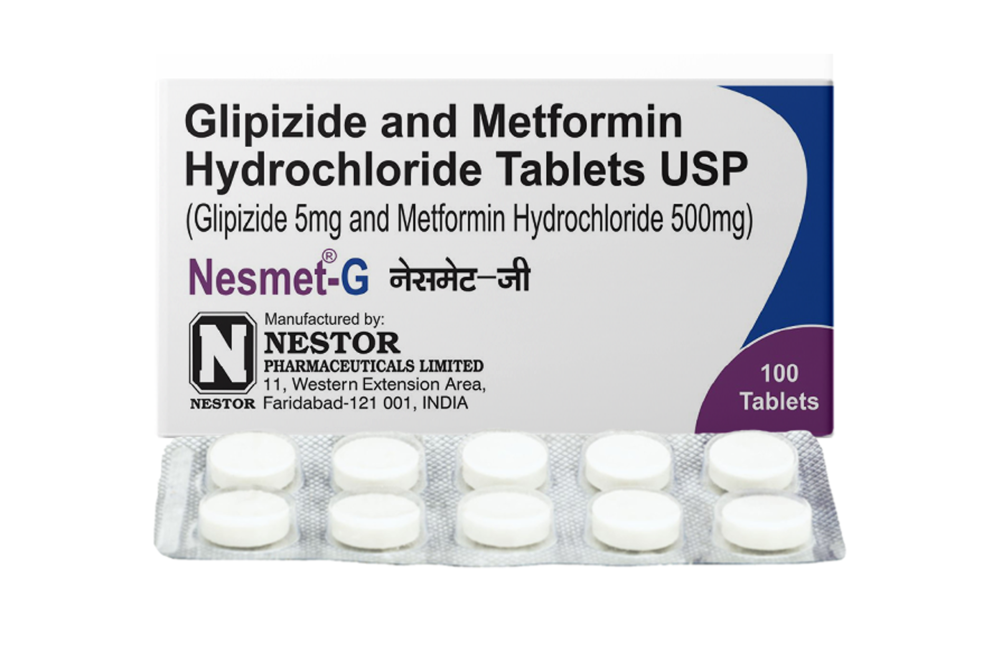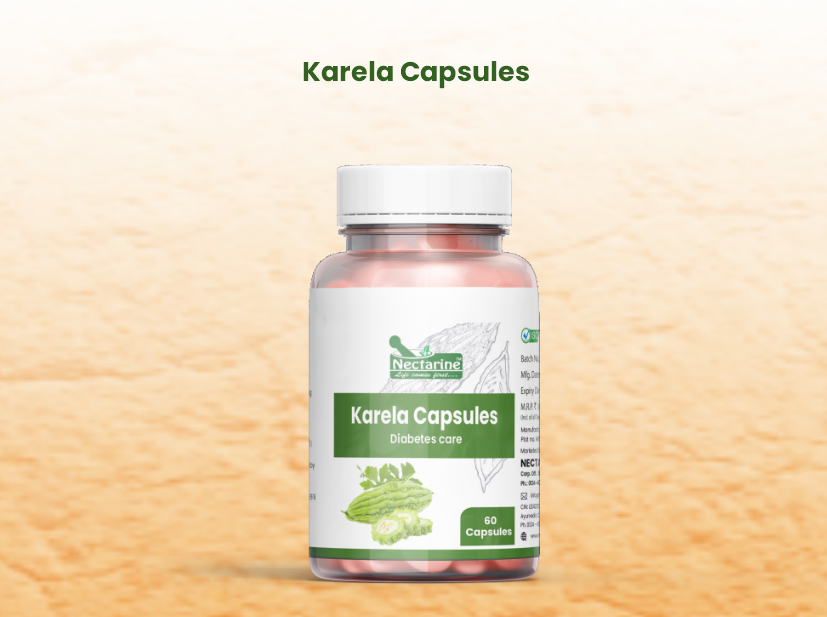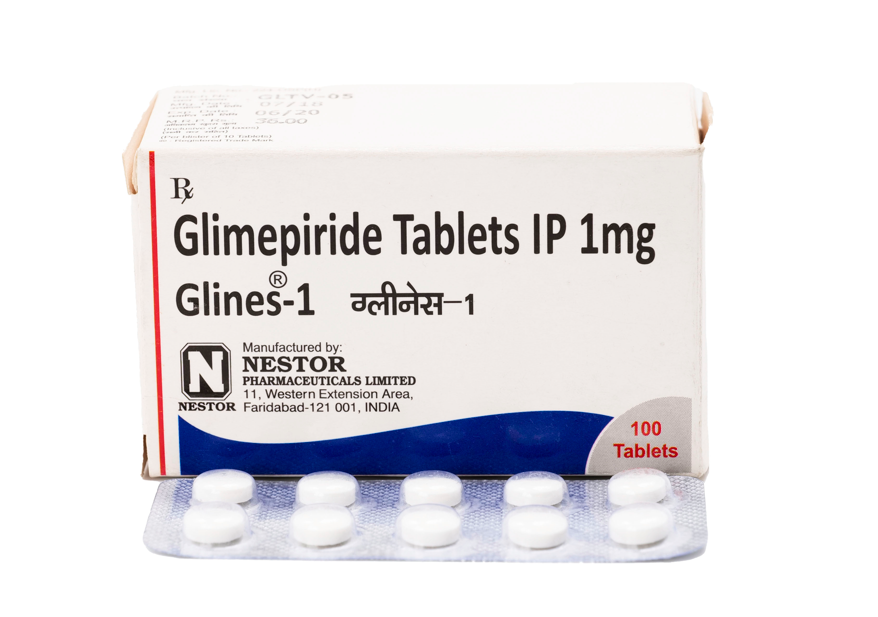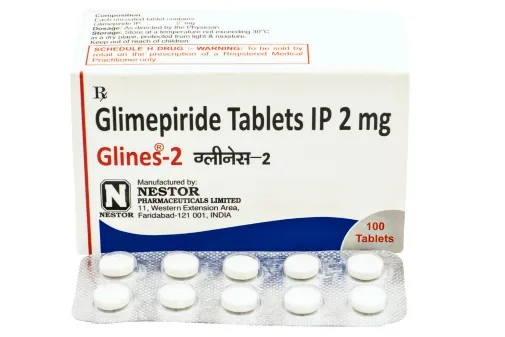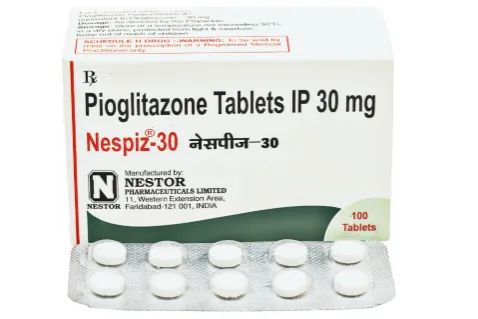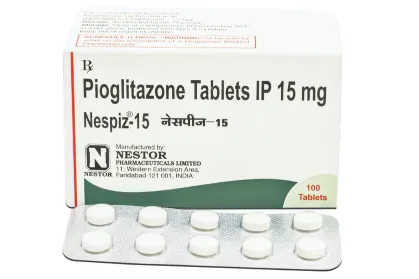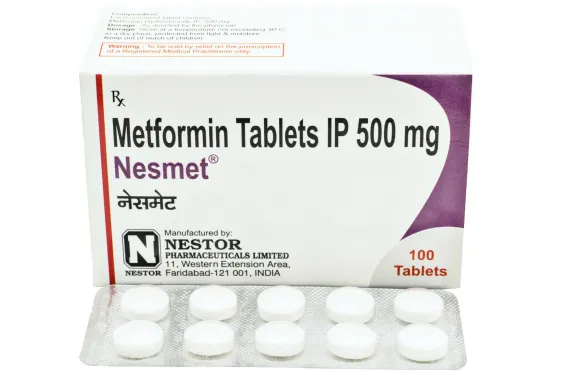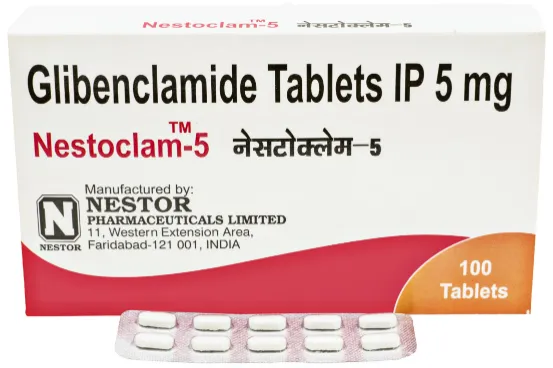GLIPIZIDE AND METFORMIN HYDROCHLORIDE TABLETS USP (5 MG + 500 MG)
TABLET RxNESMET-G
MRP:
24.00/-
Price: 21.60/-
(10% Off )Packing: Strip of 10 tablets
Therapeutic Indications
- The Product is recommended for use to treat the following:
- Type 2 diabetes (non-insulin-dependent diabetes) and helps to lower your blood glucose (sugar) levels
Usage Directions
- Take this medicine in the dose and duration as advised by your Doctor. Swallow it as a whole with water; do not crush, break or chew it.
Precautions & Warnings
- Please consult your doctor before consuming this medicine, in case of:
- Have an examination such as x-ray or scan
- Are allergic to GLIPIZIDE AND METFORMIN or any other ingredients of this medicine
- Have breathing difficulties
- Have insulin-dependent diabetes (also called juvenile or type 1 diabetes)
- Have severe problems with your circulation (such as shock)
- Have ketone bodies and sugar in your urine
- Are treated for heart failure or have recently had a heart attack
- Suffer from episodes of unconsciousness (this may mean you have diabetic coma)
- Have a severe infection, such as an infection affecting your lung or bronchial system
- Have problems with your kidneys or liver
- Have uncontrolled diabetes
- Have major surgery
- Suffer from Glucose-6-phosphate dehydrogenase (G6PD) deficiency
- Have had a recent injury (trauma) or develop a fever or severe infection
Indicated Side Effects
- Feeling with a throbbing headache, flushed skin, increased heart rate, shortness of breath, feeling or being sick, vision problems, confusion and low blood pressure which may make you dizzy especially on standing up from lying or sitting
- An allergic reaction such as wheeziness, difficulty breathing or swelling of the eyelids, face or lips, rash or itching (especially affecting the whole body)
- A blood pigment disorder. This can cause blistering or peeling of skin exposed to sunlight, skin darkening or excessive hair growth
- Reductions in blood cells and blood platelets - skin pale yellow, cause weakness or breathlessness or make bruising, bleeding or infections more likely
- Nausea, vomiting, loss of appetite, feeling generally unwell, fever, itching, light coloured bowel movements, dark coloured urine and jaundice which causes yellowing of the skin and whites of the eyes
- Feeling sick, diarrhoea or stomach pains
- Low blood sugar (hypoglycaemia)
- Changes in taste
- Eczema (inflammation of the skin)
- Dizziness, drowsiness/sleepiness
- Shakiness (tremor), blurred vision, being sick
Interactions
- Hormonal agents containing progesterone or oestrogen, including oral contraceptives (the pill) and hormone replacement therapy (HRT)
- Fibrates (used to treat high cholesterol e.g. clofibrate)
- Sympathomimetic agents, such as nasal decongestants and bronchodilators used to treat asthma (e.g. salbutamol, ritodrine, terbutaline, isoprenaline)
- Medicines to treat bacterial infections called quinolones (e.g. ciprofloxacin)
- Corticosteroids (used to treat inflammatory conditions (e.g. prednisolone))
- Danazol (a hormone treatment)
- Phenothiazines tranquillisers (used to treat psychiatric conditions e.g. chlorpromazine, thioridazine)
- Please inform your doctor if you have recently consumed or are consuming any of the below mention medicine:
- Miconazole, fluconazole or voriconazole (used to treat fungal infections)
- Other medicines used to treat diabetes
- Non-steroidal anti-inflammatory agents (used to treat muscle and joint pain e.g. phenylbutazone, ibuprofen)
- Beta-2 agonists such as salbutamol or terbutaline (used to treat asthma)
- Aspirin or aspirin like medicines known as salicylates (usually used as pain killers)
- Medicines for the treatment of high blood pressure (ACE inhibitors and angiotensin II receptor antagonists)
- Beta-blockers (used to treat high blood pressure and certain heart conditions e.g. propranolol)
- Medicines used to treat pain and inflammation COX-2-inhibitors, such as and celecoxib
- Angiotensin converting enzyme (ACE) inhibitors (used to treat high blood pressure e.g. captopril)
- Isoniazid (used to treat tuberculosis) medicines which increase urine production (diuretics).
- Cimetidine (used to treat stomach and duodenal ulcers and other digestive disorders)
- Calcium channel blocking agents (used to treat angina and high blood pressure e.g. nifedipine or verapamil)
- Sulfonamides or chloramphenicol (used to treat bacterial infections)
- Nicotinic acid (used in vitamin supplements and to lower cholesterol and other lipid levels)
- Quinolones (used to treat bacterial infections)
- Phenytoin (used to treat epilepsy)
- Monoamine oxidase inhibitors (used to treat depression)
- Thyroid products (used to treat patients with a low production of thyroid hormones)
- Probenecid (drugs used to treat gout)
- Thiazides or other diuretics (e.g. bendroflumethiazide)
- Coumarin anticoagulants (used to treat blood clots e.g. warfarin)
Storage Condition
- Store in a cool and dry place away from sunlight or as mentioned on Product/Label.
Disclaimer
- We make no warranties or representations and disclaim all responsibility and liability for the completeness, accuracy, or reliability of the aforementioned content. Please consult your doctor and discuss all your queries related to any disease, medicine, health conditions, all possible side effects, drug interactions etc. The contents of this website are for informational purposes only and should not be considered or used as a substitute for qualified physician.

